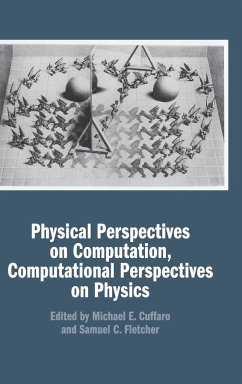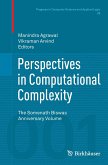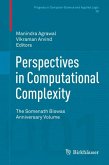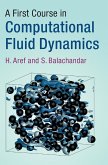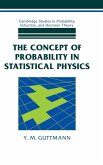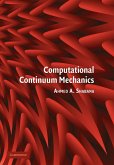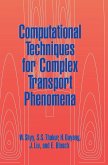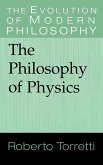Physical Perspectives on Computation, Computational Perspectives on Physics
Herausgeber: Cuffaro, Michael E.; Fletcher, Samuel C.
Physical Perspectives on Computation, Computational Perspectives on Physics
Herausgeber: Cuffaro, Michael E.; Fletcher, Samuel C.
- Gebundenes Buch
- Merkliste
- Auf die Merkliste
- Bewerten Bewerten
- Teilen
- Produkt teilen
- Produkterinnerung
- Produkterinnerung
Offers an accessible yet cutting-edge tour of the many conceptual interconnections between physics and computer science.
Andere Kunden interessierten sich auch für
![Perspectives in Computational Complexity Perspectives in Computational Complexity]() Perspectives in Computational Complexity82,99 €
Perspectives in Computational Complexity82,99 €![Perspectives in Computational Complexity Perspectives in Computational Complexity]() Perspectives in Computational Complexity82,99 €
Perspectives in Computational Complexity82,99 €![A First Course in Computational Fluid Dynamics A First Course in Computational Fluid Dynamics]() H. ArefA First Course in Computational Fluid Dynamics168,99 €
H. ArefA First Course in Computational Fluid Dynamics168,99 €![The Concept of Probability in Statistical Physics The Concept of Probability in Statistical Physics]() Y. M. GuttmannThe Concept of Probability in Statistical Physics114,99 €
Y. M. GuttmannThe Concept of Probability in Statistical Physics114,99 €![Computational Continuum Mechanics Computational Continuum Mechanics]() Ahmed A. ShabanaComputational Continuum Mechanics51,99 €
Ahmed A. ShabanaComputational Continuum Mechanics51,99 €![Computational Techniques for Complex Transport Phenomena Computational Techniques for Complex Transport Phenomena]() Wei ShyyComputational Techniques for Complex Transport Phenomena139,99 €
Wei ShyyComputational Techniques for Complex Transport Phenomena139,99 €![The Philosophy of Physics The Philosophy of Physics]() Roberto TorrettiThe Philosophy of Physics121,99 €
Roberto TorrettiThe Philosophy of Physics121,99 €-
-
-
Offers an accessible yet cutting-edge tour of the many conceptual interconnections between physics and computer science.
Hinweis: Dieser Artikel kann nur an eine deutsche Lieferadresse ausgeliefert werden.
Hinweis: Dieser Artikel kann nur an eine deutsche Lieferadresse ausgeliefert werden.
Produktdetails
- Produktdetails
- Verlag: Cambridge University Press
- Seitenzahl: 326
- Erscheinungstermin: 1. März 2019
- Englisch
- Abmessung: 235mm x 157mm x 22mm
- Gewicht: 624g
- ISBN-13: 9781107171190
- ISBN-10: 1107171199
- Artikelnr.: 50200078
- Herstellerkennzeichnung
- Libri GmbH
- Europaallee 1
- 36244 Bad Hersfeld
- gpsr@libri.de
- Verlag: Cambridge University Press
- Seitenzahl: 326
- Erscheinungstermin: 1. März 2019
- Englisch
- Abmessung: 235mm x 157mm x 22mm
- Gewicht: 624g
- ISBN-13: 9781107171190
- ISBN-10: 1107171199
- Artikelnr.: 50200078
- Herstellerkennzeichnung
- Libri GmbH
- Europaallee 1
- 36244 Bad Hersfeld
- gpsr@libri.de
List of figures; List of tables; Preface; Introduction Michael E. Cuffaro
and Samuel C. Fletcher; Part I. The Computability of Physical Systems and
Physical Systems as Computers: 1. Ontic pancomputationalism Gualtiero
Piccinini and Neal G. Anderson; 2. Zuse's thesis, Gandy's thesis, and
Penrose's thesis B. Jack Copeland, Oron Shagrir and Mark Sprevak; 3.
Church's thesis, Turing's limits, and Deutsch's principle Rossella
Lupacchini; Part II. The Implementation of Computation in Physical Systems:
4. How to make orthogonal positions parallel: revisiting the quantum
parallelism thesis Armond Duwell; 5. How is there a physics of information?
On characterizing physical evolution as information processing Owen J. E.
Maroney and Christopher G. Timpson; 6. Abstraction/representation theory
and the natural science of computation Dominic Horsman, Viv Kendon and
Susan Stepney; Part III. Physical Perspectives on Computer Science: 7.
Physics-like models of computation Klaus Sutner; 8. Feasible computation:
methodological contributions from computational science Robert H. C. Moir;
9. Relativistic computation Hajnal Andréka, Judit X. Madarász, István
Németi, Péter Németi and Gergely Székely; Part IV. Computational
Perspectives on Physical Theory: 10. Intension in the physics of
computation: lessons from the debate about Landauer's principle James
Ladyman; 11. Maxwell's demon does not compute John D. Norton; 12. Quantum
theory as a principle theory: insights from an information-theoretic
reconstruction Adam Koberinski and Markus P. Müller; Bibliography; Index.
and Samuel C. Fletcher; Part I. The Computability of Physical Systems and
Physical Systems as Computers: 1. Ontic pancomputationalism Gualtiero
Piccinini and Neal G. Anderson; 2. Zuse's thesis, Gandy's thesis, and
Penrose's thesis B. Jack Copeland, Oron Shagrir and Mark Sprevak; 3.
Church's thesis, Turing's limits, and Deutsch's principle Rossella
Lupacchini; Part II. The Implementation of Computation in Physical Systems:
4. How to make orthogonal positions parallel: revisiting the quantum
parallelism thesis Armond Duwell; 5. How is there a physics of information?
On characterizing physical evolution as information processing Owen J. E.
Maroney and Christopher G. Timpson; 6. Abstraction/representation theory
and the natural science of computation Dominic Horsman, Viv Kendon and
Susan Stepney; Part III. Physical Perspectives on Computer Science: 7.
Physics-like models of computation Klaus Sutner; 8. Feasible computation:
methodological contributions from computational science Robert H. C. Moir;
9. Relativistic computation Hajnal Andréka, Judit X. Madarász, István
Németi, Péter Németi and Gergely Székely; Part IV. Computational
Perspectives on Physical Theory: 10. Intension in the physics of
computation: lessons from the debate about Landauer's principle James
Ladyman; 11. Maxwell's demon does not compute John D. Norton; 12. Quantum
theory as a principle theory: insights from an information-theoretic
reconstruction Adam Koberinski and Markus P. Müller; Bibliography; Index.
List of figures; List of tables; Preface; Introduction Michael E. Cuffaro
and Samuel C. Fletcher; Part I. The Computability of Physical Systems and
Physical Systems as Computers: 1. Ontic pancomputationalism Gualtiero
Piccinini and Neal G. Anderson; 2. Zuse's thesis, Gandy's thesis, and
Penrose's thesis B. Jack Copeland, Oron Shagrir and Mark Sprevak; 3.
Church's thesis, Turing's limits, and Deutsch's principle Rossella
Lupacchini; Part II. The Implementation of Computation in Physical Systems:
4. How to make orthogonal positions parallel: revisiting the quantum
parallelism thesis Armond Duwell; 5. How is there a physics of information?
On characterizing physical evolution as information processing Owen J. E.
Maroney and Christopher G. Timpson; 6. Abstraction/representation theory
and the natural science of computation Dominic Horsman, Viv Kendon and
Susan Stepney; Part III. Physical Perspectives on Computer Science: 7.
Physics-like models of computation Klaus Sutner; 8. Feasible computation:
methodological contributions from computational science Robert H. C. Moir;
9. Relativistic computation Hajnal Andréka, Judit X. Madarász, István
Németi, Péter Németi and Gergely Székely; Part IV. Computational
Perspectives on Physical Theory: 10. Intension in the physics of
computation: lessons from the debate about Landauer's principle James
Ladyman; 11. Maxwell's demon does not compute John D. Norton; 12. Quantum
theory as a principle theory: insights from an information-theoretic
reconstruction Adam Koberinski and Markus P. Müller; Bibliography; Index.
and Samuel C. Fletcher; Part I. The Computability of Physical Systems and
Physical Systems as Computers: 1. Ontic pancomputationalism Gualtiero
Piccinini and Neal G. Anderson; 2. Zuse's thesis, Gandy's thesis, and
Penrose's thesis B. Jack Copeland, Oron Shagrir and Mark Sprevak; 3.
Church's thesis, Turing's limits, and Deutsch's principle Rossella
Lupacchini; Part II. The Implementation of Computation in Physical Systems:
4. How to make orthogonal positions parallel: revisiting the quantum
parallelism thesis Armond Duwell; 5. How is there a physics of information?
On characterizing physical evolution as information processing Owen J. E.
Maroney and Christopher G. Timpson; 6. Abstraction/representation theory
and the natural science of computation Dominic Horsman, Viv Kendon and
Susan Stepney; Part III. Physical Perspectives on Computer Science: 7.
Physics-like models of computation Klaus Sutner; 8. Feasible computation:
methodological contributions from computational science Robert H. C. Moir;
9. Relativistic computation Hajnal Andréka, Judit X. Madarász, István
Németi, Péter Németi and Gergely Székely; Part IV. Computational
Perspectives on Physical Theory: 10. Intension in the physics of
computation: lessons from the debate about Landauer's principle James
Ladyman; 11. Maxwell's demon does not compute John D. Norton; 12. Quantum
theory as a principle theory: insights from an information-theoretic
reconstruction Adam Koberinski and Markus P. Müller; Bibliography; Index.

